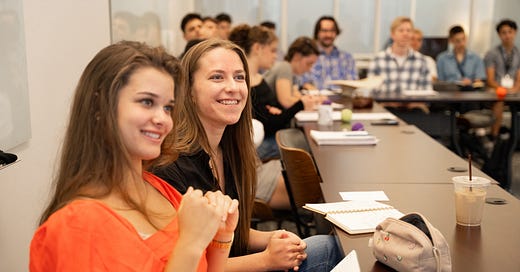52 Texts Our Students Are Reading
Plus: Some films, speeches, and symphonies for ditching the heat.
You could spend four years slumped in the back of a lecture hall or half-focused on Zoom. Just another bored face or—worse—a black screen.
Why prepare for class if no one cares?
Why pose a question if you’re only ever met with glazed eyes and rote answers?
Why struggle to articulate your beliefs, when ChatGPT makes sharing the right ones so easy?
Unprepared, uncurious, and unprincipled. This is the norm, but are you happy with the norm?
We’re not, so we’re offering something better. At UATX, our freshmen pull all-nighters reading Dante and Hegel. They pose tough questions—in class, after class, over pizza, and with leading commentators. They organize student lectures on metamodernism and Allan Bloom. They write many of their essays by hand. And they read. A lot.
Our freshmen read so much this spring that we had to abbreviate this list. So here are just a few of the texts they’ve been confronting this term. Fifty-two, to be exact.
The (Partial) Spring Reading List:
Plus a few films, speeches, and symphonies.
Analytical Tools for Politics and Economics, Prof. Scott Scheall
The Social Contract, Jean-Jacques Rousseau
The Tyranny of Experts: Economists, Dictators, and the Forgotten Rights of the Poor, William Easterly
Dialogues Concerning Natural Religion, David Hume
The Theory of Moral Sentiments, Adam Smith
Bitcoin, Blockchain, and Cryptocurrency, Prof. Thomas Hogan
Resistance Money: A Philosophical Case for Bitcoin, Andrew M. Bailey, Bradley Rettler, and Craig Warmke
Gradually, Then Suddenly, Parker A. Lewis
Christianity and Islam, Europe and the East, sections taught by Professors Brandon Deadman, Isabella Reinhardt, Azadeh Vatanpour, Jacob Wolf, and Jonathan Yudelman
Confessions, Saint Augustine
Incoherence of the Philosophers, Al-Ghazali
The Travels, Marco Polo
Orientalism, Edward Said
Crown, Cathedral, and Crusade, Prof. Clay Greene
Muhammad: His Life Based on the Earliest Sources, Martin Lings
Vita Nuova, Dante Alighieri
The Life of Charlemagne, Einhard
Proslogion, St. Anselm
Discourses on Livy, Prof. Jonathan Yudelman
The Prince, Nicolo Machiavelli
Discourses on Livy, Nicolo Machiavelli
Also recommended: Leo Strauss’s Thoughts on Machiavelli, Harvey Mansfield’s Machiavelli’s Effectual Truth: Creating the Modern World, and Quentin Skinner’s Machiavelli: A Very Short Introduction
Foundations of Macroeconomics I, Prof. Thomas Hogan
Modern Principles of Economics, Tyler Cowen and Alex Tabarrok
Historiography and the Philosophy of History, Prof. Brandon Deadman and Visiting Prof. and UATX co-founder Niall Ferguson
The Histories, Polybius
The Annals, Tacitus
The Decline and Fall of the Roman Empire, Edward Gibbon
“Second Draft (1830): The Philosophical History of the World,” in Lectures on the Philosophy of World History, G. W. F. Hegel
War and Peace, Leo Tolstoy
Intellectual Foundations of Economics, sections taught by Professors Thomas Hogan and Scott Scheall
A Conflict of Visions, Thomas Sowell
First Alcibiades, Plato
An Essay on the Principle of Population, Thomas Robert Malthus
Principles of Political Economy, John Stuart Mill
“Manifesto of the Communist Party,” Karl Marx and Friedrich Engels
“Socialism: Utopian and Scientific,” Friedrich Engels
State and Revolution, Vladimir Lenin
“Economic Calculation in the Socialist Commonwealth,” Ludwig von Mises
Special Topics in Film: Facing the Mad Soul: Werner Herzog and Klaus Kinski, Prof. Alex Priou
Conquest of the Useless: Reflections from the Making of Fitzcarraldo, Werner Herzog
Heart of Darkness, Joseph Conrad
Plus the films: “Aguirre,” “Fitzcarraldo,” “Burden of Dreams,” “My Best Enemy,” and “Grizzly Man”
Special Topics: Writing & Speaking, Visiting Prof. Michael Lind
“Gettysburg Address” (Reenactment), Abraham Lincoln
Address to Congress after Pearl Harbor, Franklin Roosevelt
Address to Congress in World War II, Winston Churchill
“Ich Bin Ein Berliner,” John F. Kennedy
“Tear Down This Wall,” Ronald Reagan
The Sublime and The Beautiful II: Modern and Contemporary, Prof. Clay Greene
A Philosophical Enquiry into the Origin of Our Ideas of the Sublime and Beautiful, Edmund Burke
Haikus, Basho
Beauty: A Very Short Introduction, Roger Scruton
Critique of the Power of Judgment, Immanuel Kant
Plus: Mozart’s Jupiter Symphony, Beethoven’s Symphony No. 9 (Last Movement), Mahler’s Symphony No. 2 (Last Movement), and “Tokyo Story” (1953)
Work, Leisure, and the Good Life, Prof. Jonathan Yudelman
Shop Class as Soulcraft: An Inquiry into the Value of Work, Matthew B. Crawford
Leisure: The Basis of Culture, Josef Pieper
Politics, Aristotle
The Wealth of Nations, Adam Smith
“An Apology for Idlers,” Robert Louis Stevenson
Writing and the English Language, Prof. Boris Fishman
The Art of Fiction: Notes on Craft for Young Writers, John Gardner
Woe is I: The Grammarphobe's Guide to Better English in Plain English, Patricia T. O’Conner
Tristram Shandy, Laurence Stern
Middlemarch, George Eliot
How did the great humanists learn Latin and Greek?
UATX's Center for Education and Public Service is proud to host the Teaching Through Immersion Conference in Austin, Texas this July 7–11. We're inviting K-12 classical educators to explore the immersive, spoken-language methods used by Renaissance scholars like Erasmus, Comenius, and Thomas More. Bring the classical languages to life with us!





You guys should publish recorded lectures online. MIT Opencourseware was a game changer for me in high school, and if you’re doing something different than most universities, I think there are a lot of people who would be interested in them.
The Jewish tradition is foundational for the West. You do not have a singe text from it, or about it?! There are a zillion possibilities!! For a single instance, look at Leon Kass. If you want a superb, super accesible, and delightful short book, look at Reading Ruth. You will instantly learn how non-Greek and non-Roman, and truly Jewish our civilization is at the most fundamental level: family, children, love, loyalty, solidarity, friendship. C’mon people, get it together!